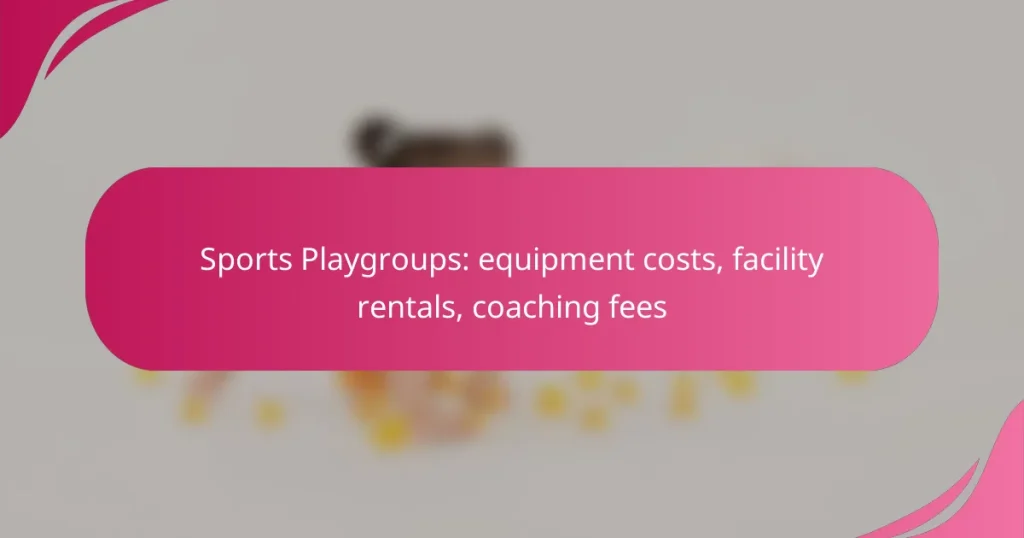When organizing sports playgroups, it’s essential to consider the various costs involved, including equipment, facility rentals, and coaching fees. Equipment expenses can range from a few hundred to over a thousand dollars annually, depending on the sport and number of participants. Facility rental prices vary significantly based on location and type, with indoor spaces typically costing more than outdoor fields. Additionally, coaching fees can range from $20 to $100 per hour, influenced by the sport and the coach’s experience.
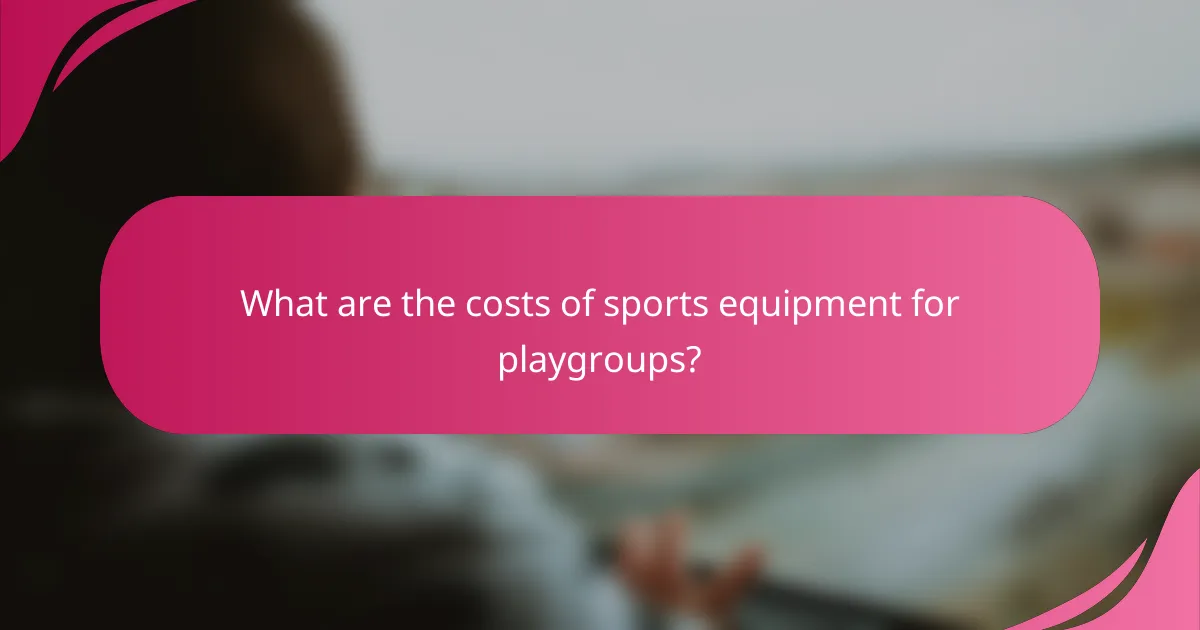
What are the costs of sports equipment for playgroups?
The costs of sports equipment for playgroups can vary significantly based on the sport, quality of gear, and brand. Generally, parents and organizers should expect to spend anywhere from a few hundred to over a thousand dollars annually, depending on the number of participants and the level of play.
Average costs for soccer gear
For soccer gear, the average costs typically range from $50 to $150 per child. Essential items include a soccer ball, cleats, shin guards, and appropriate clothing. Higher-quality gear can increase costs, especially if purchasing from well-known brands.
Additionally, teams may require uniforms, which can add another $30 to $100 per player. Consider bulk purchasing options to save on team uniforms.
Average costs for basketball equipment
Basketball equipment costs generally fall between $60 and $200 per child. Key items include a basketball, supportive shoes, and practice attire. Prices can vary based on the brand and whether the gear is for recreational or competitive play.
Teams often need jerseys, which can range from $25 to $75 each. Look for local suppliers or online deals to minimize expenses.
Average costs for baseball gear
The average costs for baseball gear can range from $75 to $250 per child. Essential equipment includes a glove, bat, helmet, and cleats. Prices vary widely depending on the quality and brand of the equipment.
Uniforms are also a consideration, with costs typically between $30 and $100. Consider second-hand options or community resources to reduce costs.
Factors influencing equipment prices
Several factors can influence the prices of sports equipment, including brand reputation, material quality, and whether the items are new or used. High-performance gear designed for competitive play tends to be more expensive than basic recreational equipment.
Seasonal sales and local sporting goods stores can offer discounts, so timing purchases can lead to significant savings. Additionally, bulk purchases for teams often result in lower per-item costs.
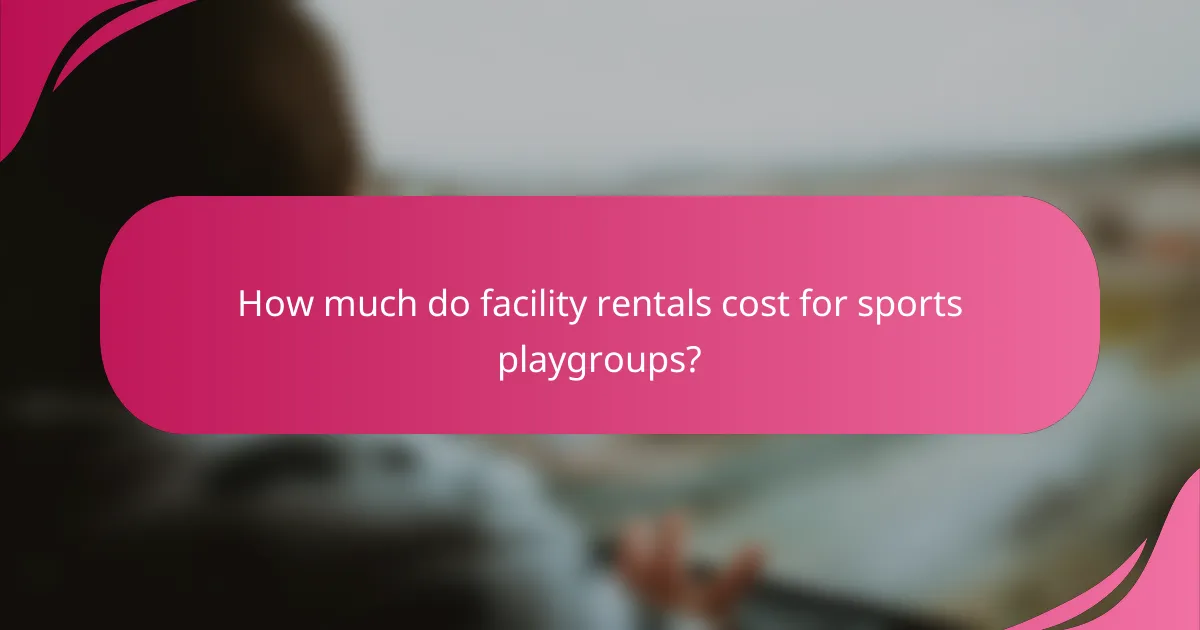
How much do facility rentals cost for sports playgroups?
Facility rentals for sports playgroups can vary significantly based on location, type of facility, and time of use. Generally, indoor facilities tend to be more expensive than outdoor fields, with hourly rates reflecting the amenities and services offered.
Average hourly rates for indoor sports facilities
Indoor sports facilities typically charge between $50 to $150 per hour, depending on factors such as location and the type of sport. Facilities with specialized equipment or additional amenities, like locker rooms and seating areas, may command higher rates.
For example, a basketball court in a metropolitan area might cost around $100 per hour, while a smaller gym in a rural setting could be available for $50. It’s advisable to compare multiple venues to find the best fit for your budget.
Average hourly rates for outdoor sports fields
Outdoor sports fields generally have lower rental costs, averaging between $30 to $80 per hour. The price can fluctuate based on the field’s condition, location, and whether it includes additional features like lights or seating.
For instance, a soccer field in a suburban area may charge around $40 per hour, while a well-maintained field in a city could reach $80. Always check for any additional fees, such as maintenance or cleanup costs, that might apply.
Seasonal pricing variations
Seasonal demand can significantly impact facility rental prices. During peak seasons, such as spring and fall for outdoor sports, rates may increase by 20% to 50% compared to off-peak times like winter.
For example, renting an indoor facility for a winter league might be less expensive than during the busy summer months when many leagues are active. Planning ahead and booking during off-peak times can help save costs.
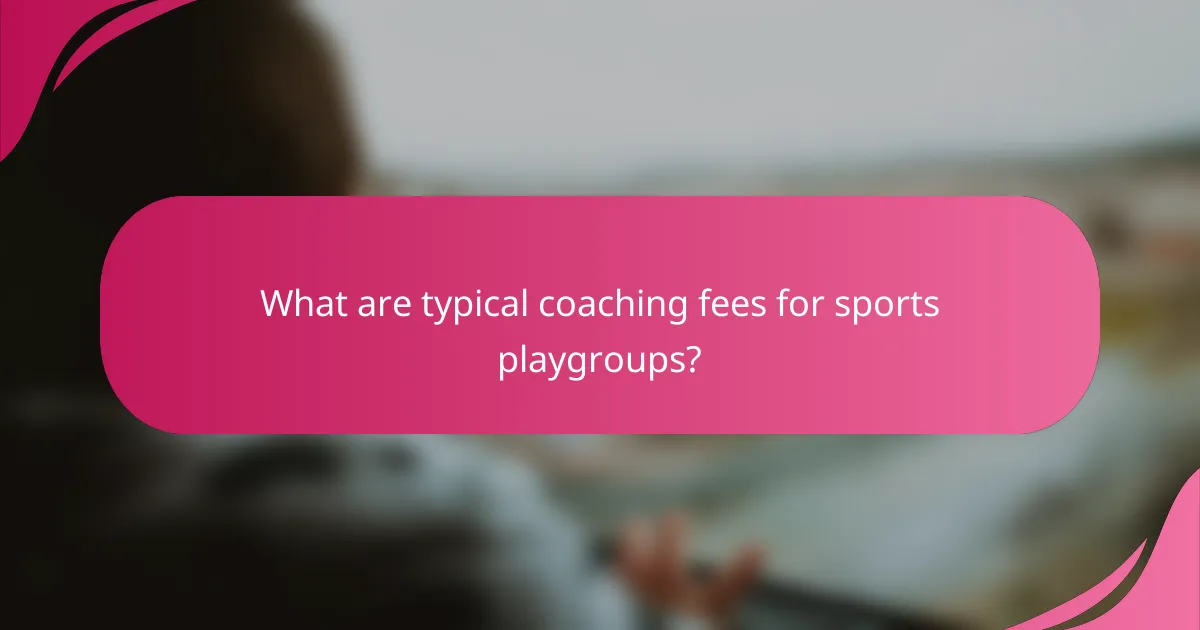
What are typical coaching fees for sports playgroups?
Typical coaching fees for sports playgroups can vary widely based on several factors, including the sport, location, and the coach’s experience. Generally, you can expect to pay anywhere from $20 to $100 per hour for coaching services.
Average coaching fees per hour
The average coaching fees per hour typically range from $25 to $75, depending on the sport and the coach’s qualifications. For example, youth soccer coaches may charge around $30 per hour, while specialized sports like gymnastics or swimming can command higher rates, often reaching $60 or more.
In urban areas, fees may be on the higher end of the spectrum, while rural locations might offer more affordable options. It’s essential to research local rates to find a suitable coach within your budget.
Factors affecting coaching rates
Several factors can influence coaching rates, including the coach’s experience, the level of competition, and the duration of sessions. Coaches with advanced certifications or extensive experience typically charge more due to their expertise.
Additionally, the type of sport can play a significant role; team sports may have different pricing structures compared to individual sports. Group coaching sessions can also reduce costs, as fees are often lower per participant when shared among multiple athletes.
Cost comparisons between different sports
Coaching fees can vary significantly between different sports. For instance, team sports like basketball and soccer generally have lower hourly rates compared to individual sports such as tennis or martial arts, which may require specialized training.
Here’s a brief comparison of average coaching fees for various sports:
- Soccer: $25 – $50 per hour
- Basketball: $30 – $60 per hour
- Tennis: $40 – $80 per hour
- Swimming: $50 – $100 per hour
These figures can help you gauge what to expect when budgeting for coaching services in your chosen sport.
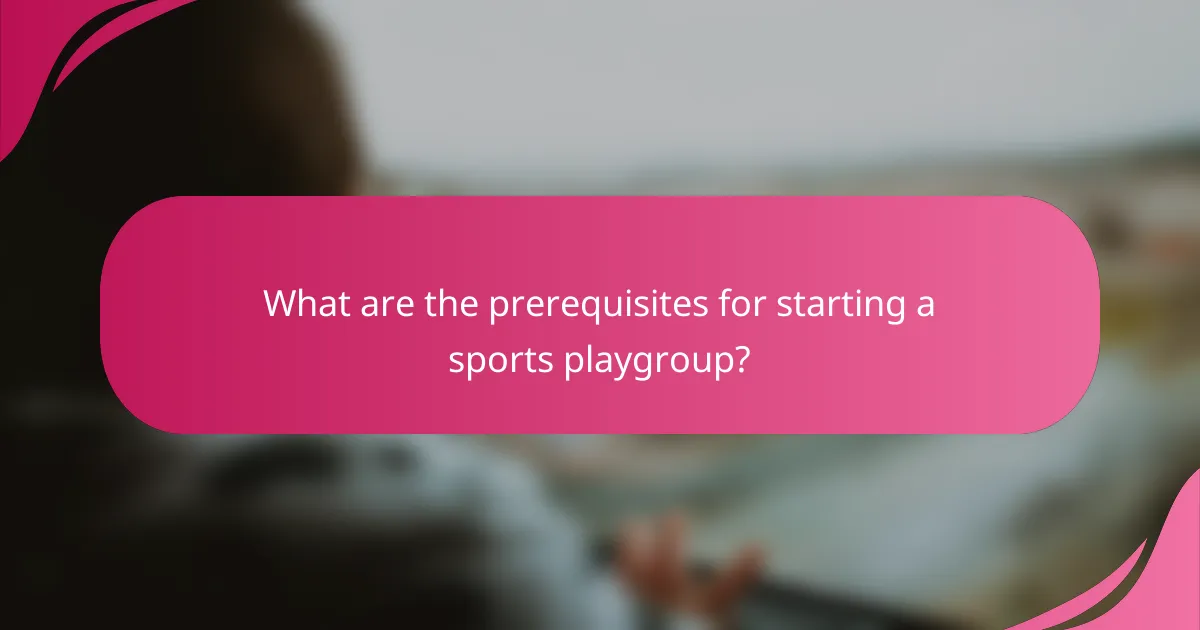
What are the prerequisites for starting a sports playgroup?
Starting a sports playgroup requires careful planning and compliance with local regulations. Key prerequisites include obtaining necessary permits, securing insurance, and ensuring access to suitable facilities.
Necessary permits and licenses
To operate a sports playgroup, you may need various permits and licenses depending on your location. Common requirements include a business license, facility use permits, and possibly health and safety certifications.
Check with local authorities or sports governing bodies to understand specific regulations. For instance, in the United States, many states require a general liability permit for organized sports activities.
Insurance requirements
Insurance is crucial for protecting your playgroup against potential liabilities. Most playgroups should consider obtaining general liability insurance, which covers injuries and accidents that may occur during activities.
Additionally, you might want to look into participant accident insurance, which provides coverage for injuries sustained by players. Costs for insurance can vary widely, often ranging from a few hundred to several thousand dollars annually, depending on the size and scope of your playgroup.
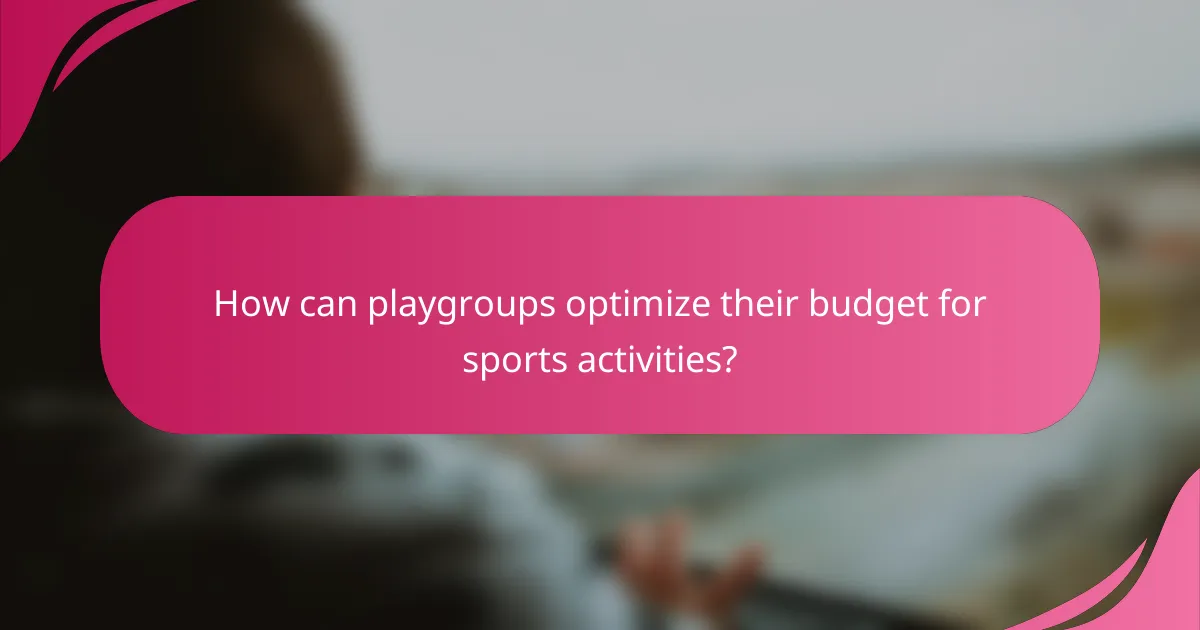
How can playgroups optimize their budget for sports activities?
Playgroups can optimize their budget for sports activities by strategically managing equipment costs, negotiating facility rentals, and finding affordable coaching options. By implementing these strategies, they can ensure a more sustainable financial approach while providing quality sports experiences for participants.
Strategies for reducing equipment costs
To reduce equipment costs, playgroups should consider purchasing second-hand gear or forming partnerships with local sports stores for discounts. Many retailers offer bulk purchase options that can significantly lower prices, especially for essential items like balls, nets, and uniforms.
Another effective strategy is to organize community fundraisers or donation drives to gather equipment. Engaging parents and local businesses can help acquire necessary items without straining the budget. Additionally, sharing equipment among neighboring playgroups can further minimize expenses.
Ways to negotiate facility rental fees
Negotiating facility rental fees involves researching local venues and understanding their pricing structures. Playgroups should inquire about off-peak rates, which can be significantly lower than standard fees. Establishing a long-term rental agreement may also provide leverage for discounts.
Building relationships with facility managers can lead to better deals. Regular communication and demonstrating commitment to maintaining the space can result in favorable terms. Additionally, consider proposing a barter system where services, such as volunteer work, can offset rental costs.
Finding affordable coaching options
Affordable coaching options can be found by tapping into local colleges or universities where students may be seeking practical experience. Many aspiring coaches offer their services at lower rates to build their resumes while providing quality instruction.
Another option is to explore community programs or non-profit organizations that focus on youth sports. These entities often have trained coaches available at reduced fees. Additionally, consider organizing volunteer coaching clinics where parents or community members can be trained to lead practices, further reducing costs.

What are emerging trends in sports playgroups?
Emerging trends in sports playgroups focus on enhancing accessibility and engagement through technology and innovative practices. Key developments include the rise of virtual coaching platforms, which provide flexible training options, and a growing emphasis on inclusive participation for diverse age groups and skill levels.
Growth of virtual coaching platforms
Virtual coaching platforms have gained popularity as they offer athletes personalized training from the comfort of their homes. These platforms typically include video tutorials, live coaching sessions, and performance tracking tools, making them accessible for various sports.
When considering a virtual coaching platform, look for features such as interactive feedback, community support, and flexible scheduling. Many platforms operate on subscription models, with costs ranging from $10 to $50 per month, depending on the level of service and expertise offered.
To maximize the benefits of virtual coaching, ensure that athletes have access to necessary equipment and a suitable training space. Avoid platforms that lack user-friendly interfaces or clear communication channels, as these can hinder the training experience.
